Colour Wheel Blanket
29.Dec.16 / Kirsten BalleringUse all the colours you have at your disposal to create this riot of colour. The motifs blend like in a colour wheel, and are crocheted together with a pristine white.
The pattern is suitable for advanced beginners. The written instructions step you through the pattern, with an accompanying diagram that shows the construction of the motif.
Materials and preparation
Yarn
- Colour A: 1246 Maastricht x 1 ball
- Colour B: 1083 Tilburg x 1 ball
- Colour C: 1132 Leek x 1 ball
- Colour D: 1711 Leeuwarden x 1 ball
- Colour E: 1081 Gouda x 1 ball
- Colour F: 1263 Leerdam x 1 ball
- Colour G: 1316 Almelo x 1 ball
- Colour H: 1824 Enschede x 1 ball
- Colour I: 1422 Eelde x 1 ball
- Colour J: 2015 Bastogne x 1 ball
- Colour K: 1068 Den Helder x 1 ball
- Colour L: 1003 Middelburg x 1 ball
- Colour M: 1082 Zwolle x 1 ball
- Colour N: 1188 Rhenen x 1 ball
- Colour O: 1432 Heerlen x 1 ball
- Colour P: 1277 Amstelveen x 1 ball
- Colour Q: 1061 Meppel x 1 ball
- Colour R: 1084 Hengelo x 1 ball
- Colour S: 2009 Kortrijk x 1 ball
- Colour T: 2006 Luik x 1 ball
- Colour U: 1241 Den Bosch x 1 ball
- Colour V: 1390 Amersfoort x 1 ball
- Colour W: 1023 Tiel x 1 ball
- Colour X: 1123 Roermond x 1 ball
- Colour Y: 1005 Barneveld x 5 balls
Shop the yarn
You can get Scheepjes Colour Crafter from Scheepjes retailers, such as:
Crochet hook
5.0mm (US size H/8).
Measurements
The blanket measures 1.30m by 1.50m (51 by 60in). With the listed skeins you can easily make more motifs, I used approximately 50g of each 100g skein. You will need more of the Barneveld colour to join more motifs though.
Gauge/tension
One motif measures 10cm (4in) in diameter with a 5.0mm crochet hook.
Abbreviations (US terms)
- bobble st: bobble stitch (*yo, pull up loop* 3 times, yo, pull through all loops on hook)
- ch: chain
- dc: double crochet
- dc3cl: dc3cluster (indicated in pattern)
- dc4tog: double crochet 4 stitches together: (yo, pull up loop, yo, pull through first 2 loops on hook) 4 times, yo, pull through all loops on hook
- sp(s): space(s)
- ss: slip stitch
- tr: treble
- yo: yarn over
Colour layout
I’ve used a set sequence of colours to create a unique rainbow effect. I kept track of my sequence by using small pegs on a string as in the next picture, I suggest you do the same. Arrange your pegs in a rainbow sequence. When you’re creating a motif, start with a colour and either pick the 3 colours to the left or 3 colours to the right to make the subsequent motif rows. For example:
- Colour 1: 2015
- Colour 2: 1068
- Colour 3: 1003
- Colour 4: 1082
Or another example:
- Colour 1: 2009
- Colour 2: 1084
- Colour 3: 1061
- Colour 4: 1277
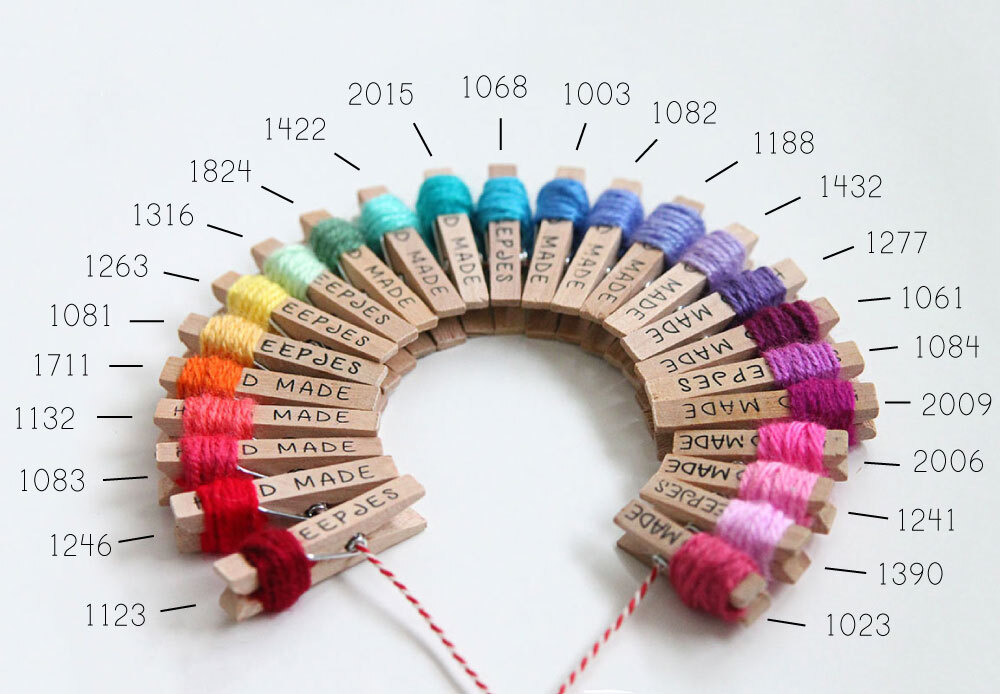
Crochet pattern
Motif
With your first colour make a magic ring.
Round 1 Ch3 (counts as first dc), 15dc in magic ring, join with ss in first dc, cut yarn. [16 dc]
Round 2 With your second colour, join with ss in space between dc, ch2, yo, pull up loop in same space, yo, pull up loop in same space, yo, pull through all loops on hook (counts as first bobble st), ch1, (1 bobble st, ch1) in every dc space, join with ss in first bobble st, cut yarn. [16 bobble st]
Round 3 With your third colour, join in space between bobble st, ch3, (yo, pull up loop, yo, pull through first 2 loops on hook) 3 times, yo, pull through all loops on hook (counts as first dc4tog), ch1, (dc4tog, ch1) in each bobble space, join with ss in first dc4tog, cut yarn. [16 dc4tog]
Round 4 With your fourth colour, join in space between dc4tog, ch3, (yo, pull up loop, yo, pull through first 2 loops on hook) 3 times, yo, pull through all loops on hook (counts as first dc4tog), ch1, dc4tog in same space, ch1, *dc4tog, ch1, (dc4tog, ch1, dc4tog) in same space, ch1; repeat from * another 6 times, join with ss in first dc4tog. Cut yarn and fasten off. [24 dc4tog]
Colour sequence of rows
For this blanket, I came up with a semi-randomized way to get that great rainbow feeling. This method might seem a bit strange at first but it works, trust me! First I made a batch of motifs, completely random (but following the rainbow sequence I made at the start!). So I had a couple of green squares, a couple of blue/purple, pink, yellows etc.
I divided these motifs into two stacks: intensely coloured motifs (with strong colours such as the bright red or the deep purple) and others. Next, I laid them out in rows. To prevent parts of the blanket being too strong in colour I avoided having 2 intense motifs next to each other, I made sure to have at least 3 or 4 other motifs in between. To see if I liked the colour distribution I squinted with my eyes and just checked if I felt like a certain colour was missing in a part of the blanket. If I liked it, I joined the rows. Then I repeated the whole process over again for the next couple of rows.
I highly recommend trying this method with your own colours. If you rather have an example of my blanket, have a look at the picture below. Because I have a lot of blue and purple shades, those colours are more present. More sparingly used shades are yellow, for example. I tried to distribute the yellow a bit more evenly and used the blue and purples as filler motifs.
I made 11 x 9 = 99 motifs.
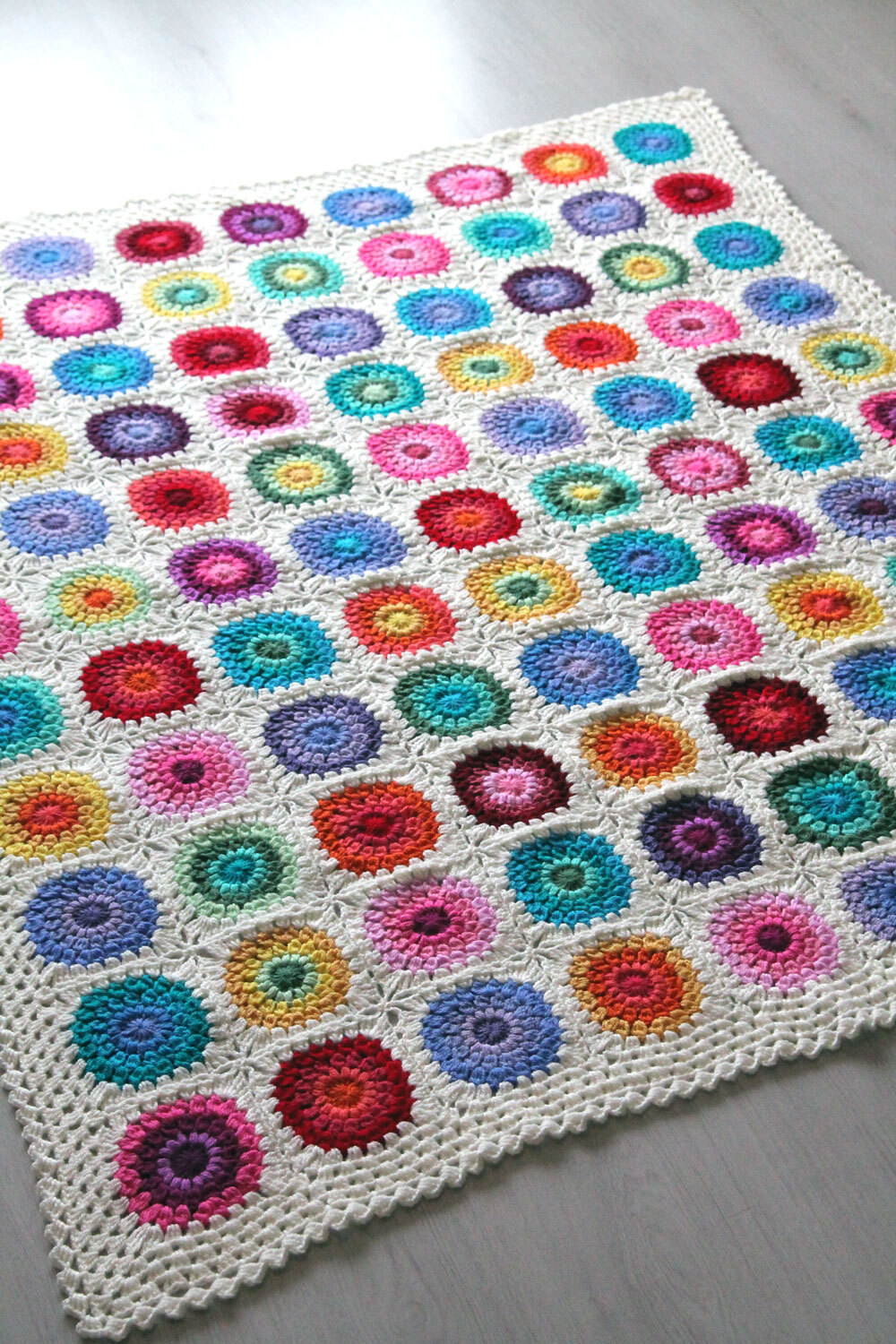
Joining motifs
First motif
With Colour Y, join in any dc4tog space, ch3, 2dc in same sp (counts as first dc3cl), dc3cl in each of next 4 sps, (3tr, ch2, 3tr) in next space, *dc3cl in each of next 5 sps, (3tr, ch2, 3tr) in next sp; repeat from * another 2 times, join with ss in first dc3cl. Cut yarn.
Subsequent motifs
Pick your subsequent square and work the joining round, attach the square with a ss in each dc3cl sp and in the ch2 of the 3tr-corners of adjacent squares.
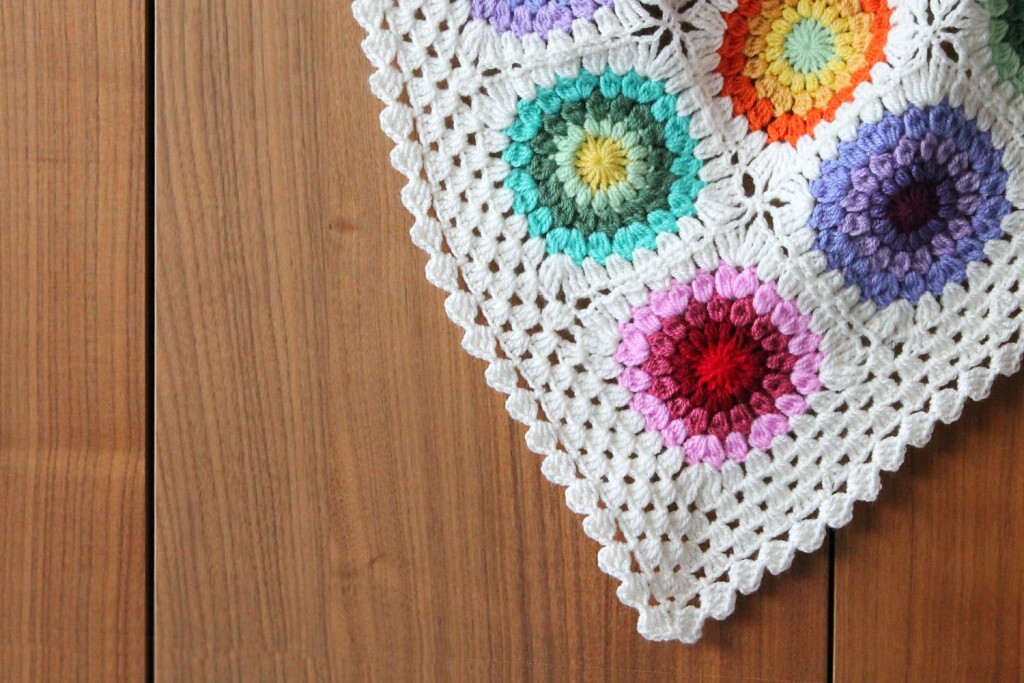
Edging
Row 1 With Colour Y, join in corner of blanket, (dc3cl, ch2, dc3cl) in corner sp, *dc3cl in each of next 6 sps, (yo, pull up loop in last sp of square, yo, pull through first 2 loops) 2 times, (yo, pull up loop in next square’s first sp, yo, pull through first 2 loops) 2 times, yo, pull through all loops on hook; repeat from * for all squares until the next corner. Continue with (dc3cl, ch2, dc3cl) in each corner space, repeat between * and ; for each side. join with ss in first dc3tog, cut yarn.
Row 2 Join in any space, dc3cl in each space (treating the dctog-clusters for the corners of each motif as one cluster), (dc3cl, ch2, dc3cl) in each corner. Join with ss in first dc3cl, cut yarn.
Row 3 Repeat Row 2.
Row 4 Join with ss in corner space, ch3, *dc in next space, ch3, 3dc around the post of the dc you made in the sp; repeat from * around the blanket and make two blocks in each corner. Join with ss in third ch. Fasten off.
For more clarification on Row 4, see this link: Block edging.
Diagram
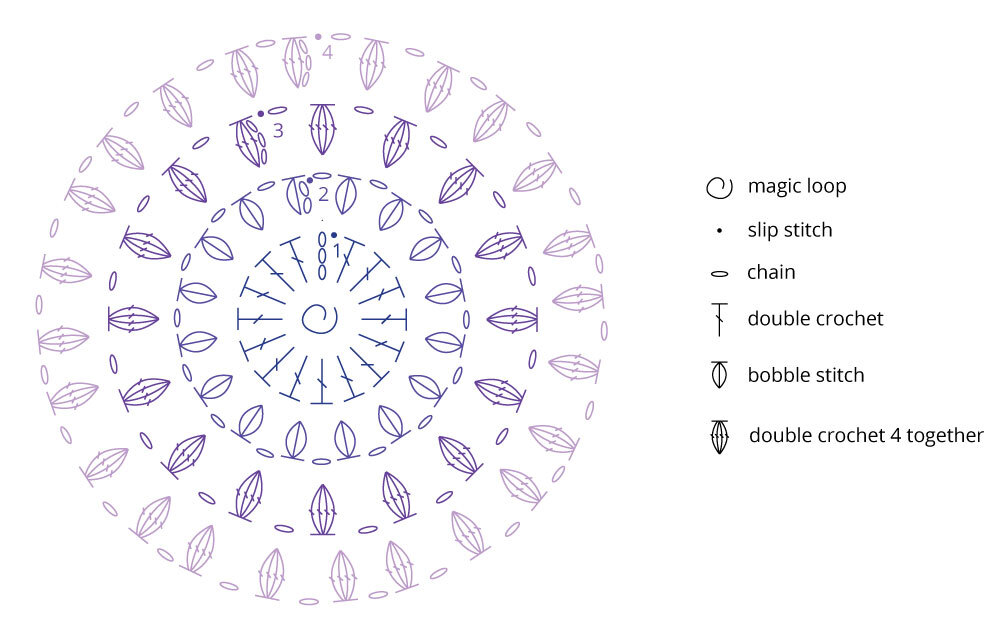


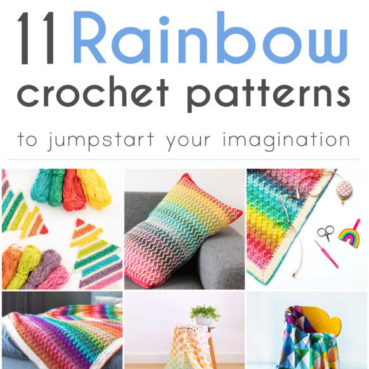

Comments